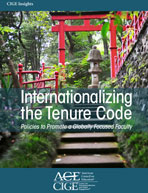New Report Assesses Cultural Competence at the United States Coast Guard Academy
Title: An Assessment of Cultural Competence at the United States Coast Guard Academy
Authors: Panel of the National Academy of Public Administration for the U.S. Coast Guard Academy
Source: National Academy of Public Administration
Over the last year, the National Academy of Public Administration (NAPA) has conducted research to assess the cultural competence of cadets, faculty, and staff at the United States Coast Guard Academy (USCGA). This research was mandated by the Coast Guard Academy Improvement Act, part of the National Defense Authorization Act.
Cultural competence is here defined as “a congruent set of behaviors, attitudes, and policies that enable a system, agency, or professionals to work effectively in cross-cultural situations (p. 13).” The concept includes diversity, equity, and inclusion (DEI) as key components.
The report outlines 16 characteristics that reflect cultural competence and proficiency in the context of a military service academy. The authors then grouped the 16 characteristics into five overarching research themes:
- Leadership vision and commitment to cultural competence
- Incident response
- Active learning, continuous improvement, and partnerships
- Training and curriculum
- Screening, hiring, and admissions
Based on the five themes, this report observed institutional practices, policies, and structures of USCGA and identified gaps against a target proficient state of cultural competence. For this, the research team reviewed documentary sources and interviewed more than 290 people including USCGA’s cadets, faculty, and staff from various demographic backgrounds. This data collection and analysis process focused on three areas in particular: cultural competence and DEI research in higher education settings; USCGA-specific inquiries; and other military academies’ practices regarding cultural competence issues.
This study found that the USCGA had launched various initiatives to achieve a culturally competent environment; and the leaders at USCGA had been committed to improving their cultural competence and considered DEI as an essential component. Based on the findings, the authors made 18 recommendations under the five themes to advance USCGA’s cultural competence, including four that they identified as the highest priority:
- Releasing a comprehensive and detailed DEI action plan with a long-term timeline;
- Revisiting and broadening responsibilities of the chief diversity officer (CDO) to make the position a strategic advisor of the superintendent;
- Strengthening leadership structures to improve governance and oversight of all initiatives;
- Detailing and tracking metrics to measure progress and guide efforts to improve cultural competence
Click here to read the full report.
—Ji Hye “Jane” Kim
If you have any questions or comments about this blog post, please contact us.


